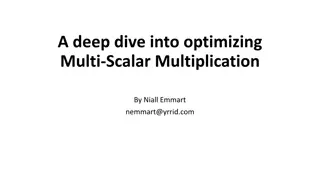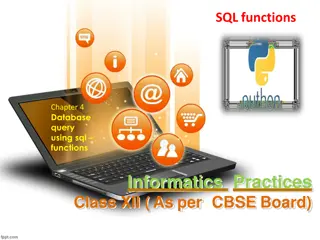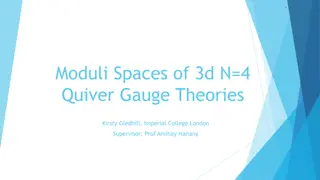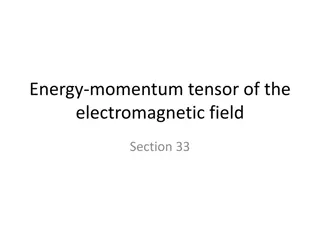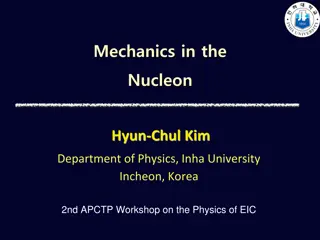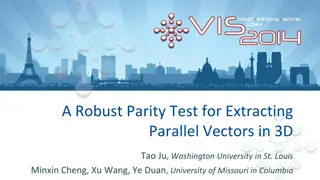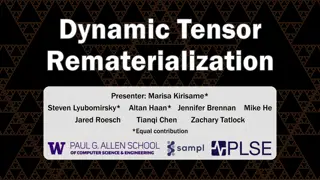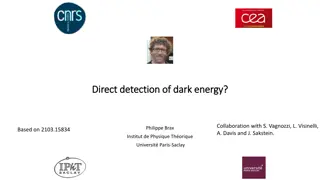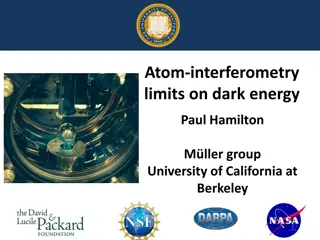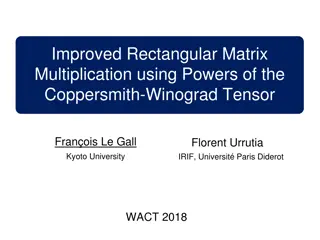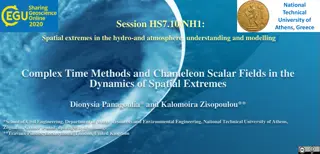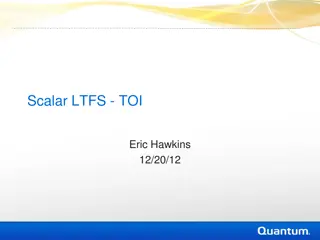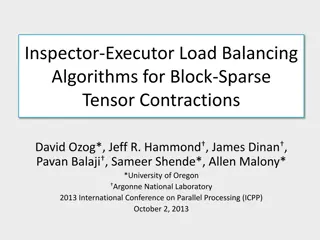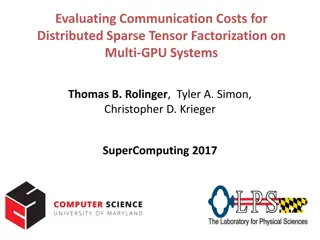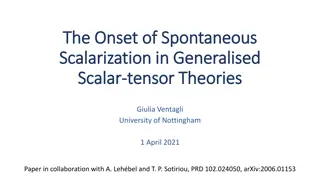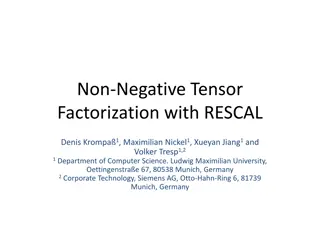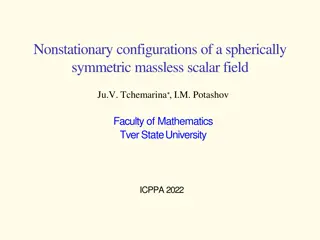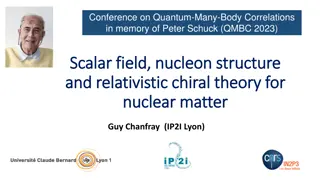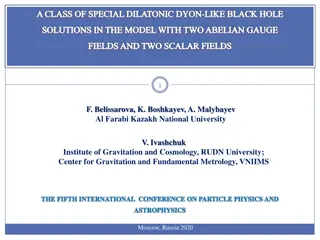Theories Explaining Deviant Sexual Behavior Throughout History
Explore historical theories on deviant sexual behavior, including demonological, anomie, psychoanalytical, human ecology, and somatotyping theories. These theories range from supernatural beliefs of possession to scientific interpretations of societal influences and individual characteristics.
2 views • 33 slides
Understanding Vector Operations in Linear Algebra
Explore the world of vector operations in linear algebra through this detailed presentation. Learn about vector addition, scalar multiplication, field operations, and more. Gain insights into the notation of Fn and the significance of scalar multiplication and vector addition in linear algebra. Whet
8 views • 9 slides
Psychological Theories of Criminality: Understanding the Roots
Psychological theories of criminality delve into the association between intelligence, personality, learning, and criminal behavior. Major theories include Psychodynamic Theory by Freud, Behavioral Theory by Bandura, and Cognitive Theory by Kohlberg. These theories explore how unconscious mental pro
1 views • 20 slides
Exploring Leadership Theories: Traits and Behaviors
Leadership theories have evolved from trait theory focusing on personal qualities to behavioral theories emphasizing actions and interactions. While early research sought universal traits for leadership, it encountered challenges due to varied traits among leaders and non-leaders. Behavioral theorie
2 views • 29 slides
Unraveling COVID-19 Conspiracy Theories and Hoaxes
Exploring various conspiracy theories surrounding the origins of COVID-19, from bat soup to bioweapons and espionage. Dive into wilder theories involving population control, world war, and even Disney's supposed predictions. Understand the differences between conspiracy theories and hoaxes, shedding
2 views • 11 slides
Understanding Sociological Theories and Frameworks
Sociological theories, encompassing micro and macro perspectives, provide a lens to interpret societal dynamics. Consensus theories like functionalism emphasize shared norms, while conflict theories such as Marxism highlight social inequalities. Social action theories like interactionism focus on in
3 views • 21 slides
Online Seminar: Theories of Learning in Initial Teacher Education
This collection of online seminar slides introduces pre-service teachers to major theories of learning, including the Science of Learning through cognitive neuroscience. The presentation aims to help educators consider implications for teaching, recognize theories in action, and pose critical questi
1 views • 11 slides
Theories of Causation in Psychological and Social Sciences
Overview of theories of causation categorized into psychological, social psychological, and sociological perspectives. Psychological theories focus on instinctive, biological, and psychological qualities of abusers, including Attachment Theory, Psychodynamic Theory, Social Learning Theory, and Situa
0 views • 15 slides
Introduction to Quantum Chromodynamics & Field Theories in High-Energy Physics
Explore the fundamentals of Quantum Chromodynamics and Classical Field Theories in this informative lecture, covering topics such as global and local symmetries, Lagrangians, actions, and dynamics. Understand the significance of global and local symmetries in classical field theories, along with exa
2 views • 17 slides
Comprehensive Overview of Student Affairs Theories
This collection explores key theories in student affairs, including cognitive-structural theories, learning theories, and person-environment theories. Cognitive-structural theories delve into how individuals process information, while learning theories examine how people absorb knowledge. Person-env
3 views • 19 slides
Optimizing Multi-Scalar Multiplication Techniques
Delve into the world of optimizing multi-scalar multiplication techniques with a focus on improving performance, especially in Zero Knowledge Proofs systems using elliptic curves. Explore algorithmic optimizations like the Bucket Method by Gus Gutowski and learn about the runtime breakdown, motivati
3 views • 52 slides
Understanding Theories and Concepts in Research
The content delves into the fundamental concepts of theories and variables in research. It discusses the nature of theories, including descriptive, explanatory, and predictive theories. Additionally, it examines the role of concepts in providing identity and meaning to objects and phenomena. Through
2 views • 55 slides
Classical Trade Theories and Their Limitations in International Economics
Classical trade theories such as the Theory of Absolute Advantage by Adam Smith and the Theory of Comparative Advantage by David Ricardo highlight the benefits of free trade and specialization based on natural advantages. However, these theories have limitations, such as the inability to explain sce
0 views • 8 slides
Understanding SQL Functions for Database Queries
SQL functions are essential elements in performing actions and obtaining results in a database query. They come in two main types: scalar functions and aggregate functions. Scalar functions operate on single values, while aggregate functions operate on sets of data. Examples of SQL functions include
0 views • 14 slides
Exploring Moduli Spaces of 3D N=4 Quiver Gauge Theories
Study the rich moduli spaces and symmetries in 3D N=4 quiver gauge theories, analyzing superpartners, scalar fields, and the natural splitting of moduli space into Coulomb and Higgs branches. Gain insights into SUSY theories, duality, and potential applications in string theory and geometry.
0 views • 8 slides
Applying Theories and Models in Integrated Health: Module 3 Overview
This module delves into the application of various theories, perspectives, and practice models in integrated healthcare. Students will learn to utilize different theories to enhance their understanding and practice in integrated health, focusing on aspects like personal impact, behavioral change the
0 views • 78 slides
Understanding the Energy-Momentum Tensor of the Electromagnetic Field
Exploring the intricacies of the energy-momentum tensor of the electromagnetic field, including its components, symmetries, and implications on field interactions and invariants. Delve into the mathematical derivations and transformations involved in studying this fundamental concept in electromagne
0 views • 19 slides
Understanding Nucleon Structure: Insights from EIC Workshop
Exploring the mechanics of nucleons and the physics goals of the Electron-Ion Collider (EIC), this content delves into the origin of nucleon mass and spin, emergent properties of dense gluon systems, and energy-momentum tensor in QCD. It discusses the role of gluons in understanding nucleon structur
0 views • 31 slides
Robust Parity Test for Extracting Parallel Vectors in 3D
Fundamental primitives for visualizing 3D data include line features like ridges and valleys of a scalar field, stream lines of a vector field, vortices of a velocity field, and extremal curves of a tensor field. Parallel Vectors (PV) provide a unified representation of 3D line features, forming con
0 views • 27 slides
Overcoming Memory Constraints in Deep Neural Network Design
Limited availability of high bandwidth on-device memory presents a challenge in exploring new architectures for deep neural networks. Memory constraints have been identified as a bottleneck in state-of-the-art models. Various strategies such as Tensor Rematerialization, Bottleneck Activations, and G
0 views • 32 slides
Insights into Dark Energy Detection and Gravity Tests
This collaboration delves into direct detection of dark energy, evidencing acceleration in expansion and delving into the evolution of background cosmology. Gravity tests, including solar system trials, are discussed, along with models like f(R) gravity and chameleon screening in the context of scal
0 views • 20 slides
Understanding the Acceleration of the Universe and the Equivalence Principle Violation in the Horndeski Vector-Tensor Theory
Exploring the implications of the Equivalence Principle Violation after reheating in the context of the accelerated expansion of the universe. The study delves into the Horndeski vector-tensor theory, gravitational waves, and the impact of modified gravity and dark energy. Insights are provided on t
2 views • 20 slides
Understanding the Hall Effect in Conductors
The Hall Effect in conductors is described in detail, showcasing how a magnetic field affects the conductivity tensor, breaking symmetry and leading to unique properties. The discussion covers the separation of the conductivity tensor, the impact of magnetic fields on conductivity components, and th
1 views • 16 slides
Limits on Dark Energy Using Atom Interferometry - UC Berkeley Study
Research conducted by Paul Hamilton Müller's group at the University of California, Berkeley, focuses on using atom interferometry to explore dark energy. The study delves into screened scalar fields as dark energy, future reach with atom interferometry, known unknowns related to dark energy densit
0 views • 39 slides
Improved Rectangular Matrix Multiplication Using Coppersmith-Winograd Tensor
In this research, the complexity of rectangular matrix multiplication is enhanced by analyzing the fourth power of the Coppersmith-Winograd tensor. By extending the understanding of the tensor's power, significant advancements have been made in the efficiency of non-square matrix multiplication, sur
0 views • 25 slides
Understanding Spatial Extremes: Complex Time Methods in Hydro-Atmospheric Dynamics
This study explores the use of complex time methods and chameleon scalar fields in understanding and modeling spatial extremes in hydrological and atmospheric systems. By transforming Lagrangian processes and introducing chameleon scalar fields, the research unveils new insights into the mechanism g
0 views • 9 slides
Accelerating Lemma Learning Using Joins in Satisfiability Modulo Theories
Explore the use of joins in accelerating lemma learning within the context of Satisfiability Modulo Theories (SMT). The study covers various SMT applications at Microsoft and delves into the development of the Z3 solver. Key topics include theories, arithmetic operations, array theory, uninterpreted
0 views • 25 slides
Understanding Scalar LTFS: Best Practices and Key Tips
Explore the fundamentals of Scalar LTFS, a linear tape-based filesystem, including setup, operations, and best practices for efficient usage. Learn about key recommendations such as NFS version 4 on Linux, handling extents, and tape management strategies.
0 views • 12 slides
Tidal Deformability of Compact Stars Admixed with Scalar Fields Research Summary
Researchers like C. J. Horowitz and Kwing-Lam Leung are exploring the effects of dark matter, scalar fields, and ultra-light dark matter on compact stars like neutron stars. Methods involve calculating tidal love numbers, using energy-momentum tensors, and studying equilibrium solutions. The study a
0 views • 20 slides
Dynamic Load Balancing in Block-Sparse Tensor Contractions
This paper discusses load balancing algorithms for block-sparse tensor contractions, focusing on dynamic load balancing challenges and implementation strategies. It explores the use of Global Arrays (GA), performance experiments, Inspector/Executor design, and dynamic buckets implementation to optim
1 views • 32 slides
Communication Costs in Distributed Sparse Tensor Factorization on Multi-GPU Systems
This research paper presented an evaluation of communication costs for distributed sparse tensor factorization on multi-GPU systems. It discussed the background of tensors, tensor factorization methods like CP-ALS, and communication requirements in RefacTo. The motivation highlighted the dominance o
0 views • 34 slides
Understanding Spontaneous Scalarization in Gravitational Theories
Spontaneous scalarization presents a unique phenomenon where compact objects experience field growth triggered by tachyonic instability, leading to stable field configurations. Explored in various theories, such as Horndeski gravity and scalar Gauss-Bonnet gravity, spontaneous scalarization is studi
0 views • 18 slides
Theories and Concepts in Semantics: Classical vs. Prototype Approaches
Explore different theories of concepts in semantics, including classical theories based on necessary and sufficient conditions, causal theories, and prototype theories. Compare their strengths and limitations in handling fuzziness, asymmetry, and internal structure of concepts. Discover how experime
1 views • 46 slides
Integrating Theories and Models for Enhanced Health Practice
Explore the application of theories, perspectives, and practice models in integrated health through Module 3. Learn how theories guide assessment, treatment, and patient outcomes. Discover common theories enhancing assessment and supporting individuals through grief and loss. Gain insights into the
0 views • 78 slides
Non-Negative Tensor Factorization with RESCAL
This article discusses non-negative tensor factorization with RESCAL, covering topics such as Non-Negative Matrix Factorization, Multiplicative Updates, RESCAL for Relational Learning, and Non-Negative Constraint for RESCAL. It explores how factorizing matrices/tensors into non-negative factors can
0 views • 11 slides
Comprehensive Overview of Leadership Theories and Styles
Leadership encompasses the ability to influence a group towards achieving goals by knowing oneself, communicating vision, building trust, and taking effective action. Various leadership styles include Autocratic, Democratic, Free-Rein, and Paternalistic, each with distinct decision-making approaches
0 views • 19 slides
Nonstationary Configurations of a Spherically Symmetric Scalar Field
Action and stress-energy tensor, Einstein-Klein-Gordon equations, and method for constructing nonstationary configurations of a spherically symmetric scalar field are discussed in this study. The behavior of the characteristic function allows interpretations such as black holes, wormholes, or naked
0 views • 14 slides
Quantum Many-Body Correlations Conference: Remembering Peter Schuck (QMBC 2023)
Peter Schuck's contributions to nuclear physics, chiral theories, and collaborations with Lyon and Darmstadt groups in the study of quantum field theories are highlighted. His work on semi-classical techniques, neutrino-nucleus interactions, and medium-range attraction in scalar-isoscalar channels s
0 views • 14 slides
Principles of Management According to Fayol
Fayol's 14 Principles of Management include concepts such as centralisation and decentralisation, scalar chain, and order. Centralisation concentrates decision-making authority at the top level, while decentralisation disperses it across management levels. Scalar chain emphasizes the formal lines of
0 views • 29 slides
Special Dilatonic Dyon-Like Black Hole Solutions in Two-Field Model
A class of special dilatonic dyon-like black hole solutions in a model with two Abelian gauge fields and two scalar fields is explored. Motivation for the study includes dimensional reduction of supergravity models and manifestations of dark matter. The solutions involve black hole dyon solutions, a
0 views • 12 slides










